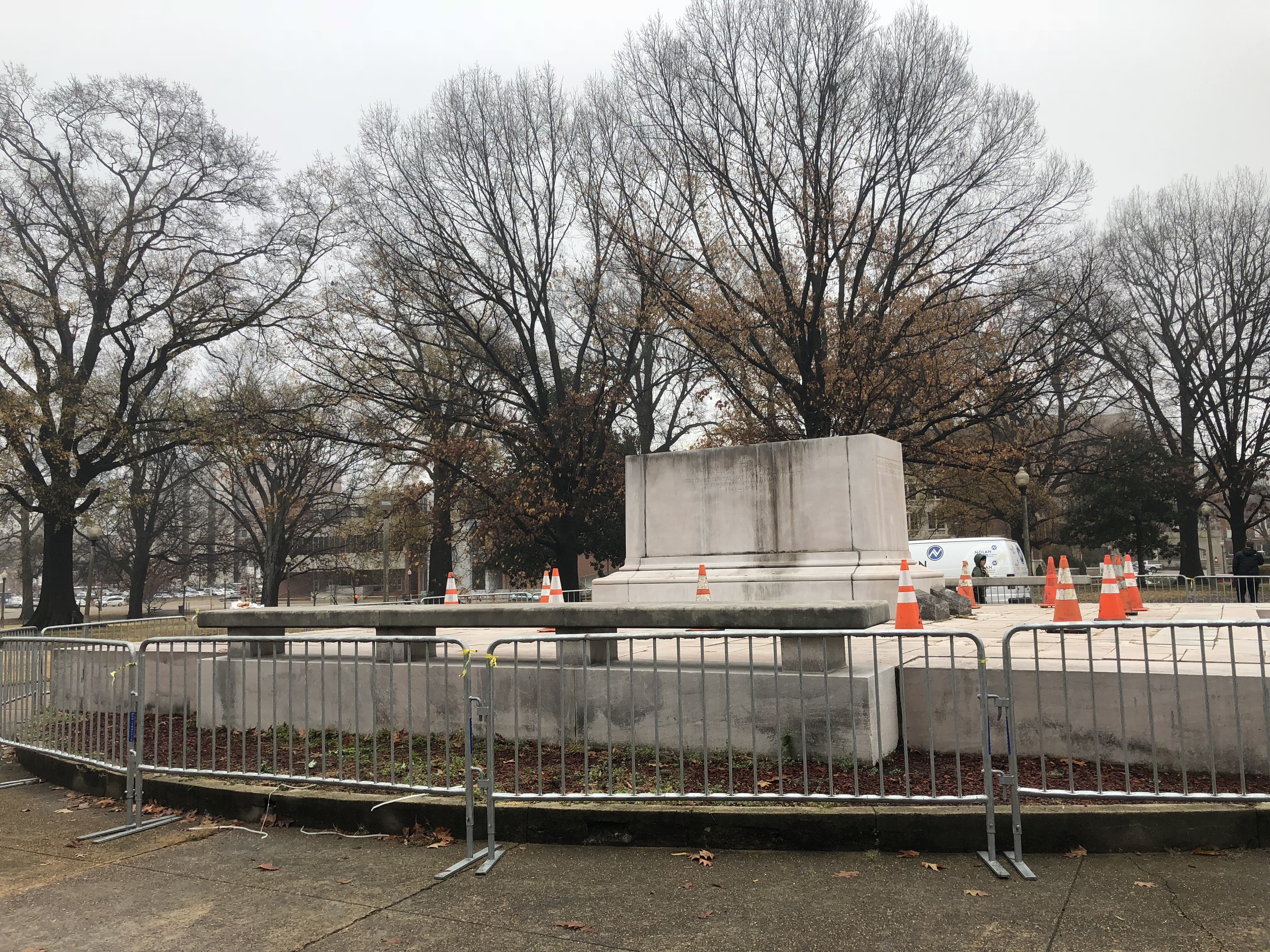
This week’s Flyer editorial concerns the case of Megan Barry, the Nashville Mayor with once-bright political prospects who was forced by a personal scandal to resign her office this week. Go here.

This week’s Flyer editorial concerns the case of Megan Barry, the Nashville Mayor with once-bright political prospects who was forced by a personal scandal to resign her office this week. Go here.
For all the eternal mutual jealousies afflicting Tennessee’s two preeminent cities — Memphis and Nashville — there are very few here on our end of that dichotomy who are enjoying the state’s latest scandal, the one that this week ended in the resignation of the capital city’s mayor, Megan Barry.

Nashville Mayor Megan Berry
Barry had served honorably and well on the Nashville-Davidson Metropolitcan Council in the years just before her election as mayor in 2015 in a hotly contested multi-candidate race. Circumstances have not been especially kind to her since that victory. The entire state — in fact, the nation — grieved with her following the loss of her son Max, who died in Denver, Colorado, in 2017, as the result of a drug overdose. The scandal, stemming from an affair she had with her assigned police bodyguard, followed not long thereafter
Technically, the cause of Barry’s fall may have been the fact that she had to acknowledge — via a nolo contendere plea — felony theft by virtue of having illegally expended taxpayer money on the bodyguard, Nashville police sergeant Robert Forrest.
In reality, her disabling weakness was an affair of the heart — one that threatened to make her an unwitting counterpart to the excesses that have been subject to much public condemnation in this age of #MeToo and Time’s Up sentiment. Recognizing the connection, Barry said upon resigning that she did not want to linger lest she further “muddy the #MeToo movement.”
Barry’s fall and disgrace is conspicuously more tragic than the case of one of her predecessors as chief executive of Nashville. That would be Bill Boner, who was forced into retirement in 1990 after a reckless affair with a country music singer that drew national headlines. One of the many differences between the two cases was that no one had thought of the aptly named Boner as a potentially significant political force on the American political scene. Barry, on the other hand, as a Democratic progressive in the South and consequently as a bridge between factions of her party, had been seen as a likely candidate for national office at some point. She was certainly regarded as a forward-looking executive as mayor, and leaves behind her a $5.4 billion mass-transit proposal for the voters of her city to dispose of in a referendum to take place on May 1st.
Nashville voters will also have the opportunity to select a replacement for Barry this year in a special election, which is likely to be a rerun of the 2015 contest which had drawn a fair number of the capital city’s big names, many of whom will get to try again. What is it they say about an ill wind that doesn’t blow somebody some good?
For our part here in the Bluff City, having seen many of our own prominent public officials separated from their reputation and their careers during the Tennessee Waltz affair and related scandals of the current century’s first decade, we know how it feels, Nashville, and we don’t feel the least bit superior in virtue. We are all human. That was Megan Barry’s unshakeable curse. And our own.
Proud as we have often been of being home base to FedEx, a company notable for its leadership in business affairs and consumer needs, we now confess to being embarrassed by the company’s refusal, in the wake of the latest gun massacre, to consider ending the favorable discounts it offers members of the National Rifle Association.

Even Donald Trump has addressed the point. The president, speaking to the nation’s governors on Monday, advised them to remember that, for all the “great people” who make up the NRA, it might be neceseary “to fight ’em” on gun-control issues. As a statement indicating intentionality, of course, that one is right up there with his quickly withdrawn pledge to a bipartisan group of Senators back in January that he would support whatever pro-Dreamer immigration bill they might come up with — hopefully an honest-to-God “bill of love.”
On matters relating to promises of action, Trump has a tendency, in Jonathan Swift’s phrase, to “say the thing that is not.” A somewhat surreal version of that came this week when the president, in the course of vilifying a security officer’s apparent inaction at the site of the Parkland High School slaughter, swore that had he been on the scene, he himself, armed or unarmed, would have rushed into the school building to confront the crazed shooter.
Right. Nothing quite so heroic is required, of course. All that Trump needs to do is follow through on his vow to contradict Wayne LaPierre and the NRA gun lobby by actually pushing for some of the serious legislative measures he has championed in his verbal bravado — a raised age limit for firearms purchase, a ban on bump stocks, stiffer and more universal background checks, etc.
The task incumbent on FedEx is even less demanding. All the giant shipping corporation needs to do is follow the example of Hertz, Delta, Symantec, MertLife, United Airlines, and a growing number of other large companies that have ended their discount offers for NRA members in the past week or so. Surely the powers-that-be at FedEx, now threatened with an organized national boycott, realize that the small profit margin forsworn by ending its NRA discounts could easily be absorbed, and that the moral example of taking a stand against gun fetishism would likely translate into a bounty of new-customer approval from the population at large.
Instead, FedEx has vowed to continue with its program for NRA members on the disingenuous grounds that it “does not or will not deny service or discriminate against any legal entity regardless of their policy positions or political views.”
Nobody has asked FedEx to deny service to anyone or to suppress anybody’s views or to practice any form of customer discrimination. It is a matter, rather, of putting the NRA on notice for its decades-long policy of undermining any and all common-sense gun reforms.
And, as far as the politics of the matter, it is clearly the NRA itself, not those who resist it, which maintains a political stranglehold on the nation and its lawmakers. In this hour of decision, FedEx absolutely, positively should take a stand.
Are they kidding? There can be several legitimate arguments adduced for and against the process of voting known as both Instant Runoff Voting and Ranked Choice Voting, but the Memphis City Council’s current campaign against the process has gone way out of bounds.
It was strange enough that the council found it necessary late last year to authorize a public citywide referendum on whether Ranked Choice Voting — to use the term adopted by county election administrator Linda Phillips and the County Election Commission — should be allowed the trial run in the 2019 city election that was authorized by the commission.
The process was overwhelmingly approved by Memphis voters in a 2008 referendum, and only a period of uncertainty as to whether the Shelby County election machines could accommodate RCV had delayed implementation. In scheduling the 2019 trial run, Phillips provided assurances that the machines now in use were sufficient.

Edmund Ford Jr.
The point of Ranked Choice Voting, already in use in several places in the United States, is to make unnecessary the expensive, inconveniently scheduled, and low-turnout runoff elections that occur when the first round of an election race has failed to yield a majority winner. Voters are presented with ballots that allow them to rank their preferences in order — usually for only three places. Should no majority winner emerge, the ballots are progressively resampled, with no change in the voters’ data, to produce an eventual outcome in which one candidate demonstrates enough support, across the board, to be adjudged a legitimate winner. On a smaller scale, this is the process by which Academy Award winners are chosen by the Motion Picture Academy.
Not only has the council chosen to try to prevent the fair trial by voting to schedule a follow-up referendum on Ranked Choice Voting this November, it has confused the issue with spurious and easily disproven claims — comparing the RCV process to the old Jim Crow poll tax, for example, as Councilman Ed Ford did in a recent public appearance.
Worse, the council has further complicated and confused things (perhaps intentionally) by scheduling a second referendum for November — this one abolishing all runoffs of any kind. If successful, this would abandon the idea of consensus winners and leave us governed by candidates who, like Donald Trump in the multi-candidate 2016 Republican primaries, manage to eke out mere pluralities.
Meanwhile the council that has theoretically arranged for Memphis voters to take a second-chance vote on RCV this fall has chosen to use our taxpayer money to pay a Nashville lobbying firm to work on behalf of a state law in the current legislative session that would ban the use of Ranked Choice Voting statewide. Should such a law pass, the referendum would be rendered null and void. “Duplicity” almost seems too mild a term to describe this action.
Do current council members fear that RCV, by insuring that closely contested election results can be resolved by the votes of a full electorate, might be a threat to their incumbency? We’re betting yes.
When Governor Bill Haslam gave his final State of the State address in Nashville on Monday night, he accentuated the positive, not unexpectedly. Haslam cited figures relating to job growth and educational achievement that seemed indeed to indicate a measure of progress. And, while his boast of having cut taxes is somewhat undermined — as is more generally the case with the tax cuts of President Trump, by the tilt of these advantages toward the wealthiest taxpayers (how many other Tennesseans have really had to worry about the inheritance tax, for example?) — the reduction on the state grocery tax is a legitimate advantage for everybody.

There have been clear failures among the first seven years of the Haslam administration, though, and the several Democratic legislators who pointed out afterward that the State of the State was conspicuously silent on the issue of health care were right on target.
Haslam might say, in his own defense, that his Insure Tennessee proposal of 2015 was a fairly strong, if belated, proposal, designed to tie into the billions of federal dollars that the Affordable Care Act would have made available for health-care expansion in Tennessee. But Insure Tennessee was scuttled by Haslam’s fellow Republicans in the General Assembly, the same ones who had successfully pressured him to put off a decision on accepting ACA funding in 2013 or 2014, when he could have done so on his own initiative, unbound by the legislative straitjacket that was imposed on the governor’s freedom of action by 2015. That rural hospitals in Tennessee have failed for lack of access to ACA funding is one of the consequences.
Quite properly, the governor made reference in his address to the ever-growing opioid-addiction menace that looms over the state. As Haslam said, “The opioid epidemic is crippling our state and our country.” But his answer to the dilemma is embedded not in concrete systematic proposal but in one of those cutesie catchphrases characteristic of the governor’s administration. As Haslam put it, “Last week, we announced TN Together, a comprehensive plan to end the opioid crisis that focuses on prevention, treatment, and law enforcement.” So far, the comprehensiveness of the plan is less notable than its vagueness.
That Haslam has all too often not been able to assert himself against special interests, such as the gun lobby and the partisan hardliners in his own party, has been one of the drawbacks of his administration, and that fact, understandably, was not included in the State of the State.
Much was said in the speech about education and the testing procedures imposed on teachers and students, but omitted was the loss of all collective bargaining opportunities for teachers, something imposed on the governor’s first education package in 2011 by then Lieutenant Governor Ron Ramsey. (Also omitted was any reference to the debacle suffered by the state when the agency entrusted with testing student performance proved unable to do so and defaulted on its contractual responsibilty.)
Still and all, Haslam has proven for the most part to be a well-intentioned chief executive, and many of the claims of progress made in the State of the State (see Politics, “Haslam Points with Pride in State of the State” for specifics) are no doubt justified or at least arguable.
The nation has just witnessed another orgy of political partisanship on steroids — the 69-hour governmental shutdown resulting from a standoff between Republicans and Democrats in Congress, with the GOP members carrying water for the immigration hardliners in President Donald Trump’s White House.

The ostensible issues involved in the standoff were hardly trivial, with congressional Democrats basing their position on a determination to see the passage of enabling legislation for the Deferred Action for Childhood Arrivals program (DACA) and Republicans being just as determined to keep anything involving DACA out of the continuing resolution bill that was being prepared to maintain the operations of the federal government.
What underscores the absurdity of the conflict is the fact that, by general consent, clear majorities existed in both parties favoring DACA, which would shield from deportation and other penalties the children, many of them now grown and active participants in the economic and civic life of America, who were brought here by parents who were themselves illegal aliens.
Legislation to restore DACA was made necessary when Trump last year arbitrarily revoked the executive order by his predecessor, President Barack Obama, that had established the program. Trump, who has an obvious fetish for eradicating any possible vestige of Obama’s two terms, claimed (and claims) that he, too, favors the concept of DACA but contended at the time that only Congress should authorize the program and set a deadline of March 4th for legislative reauthorization.
Basing their stand on a distrust of Trump’s long-evident proclivity for reversing his stated positions regularly and whimsically, the Democrats obviously wished to nail the issue down as far in advance of the President’s arbitrary deadline as possible.
Republicans, taking their cue from the aforementioned administration hardliners, resolved to resist dealing with DACA without a clear go-ahead from Trump, who has insisted on coupling DACA reauthorization with Congressional appropriations to enact his Great Wall fantasy on the border with Mexico, as well as on approval of an assortment of other harsh anti-immigrant positions. Hence, after some typical back-and-forthing from Trump that made hash of attempts to negotiate the matter, the impasse.
Disagreements are inevitable within a democratic framework, but they should be based upon legitimate divisions of opinion, not on Us-Against-Them invocations of party loyalty, which was so obviously the cause of the DACA standoff. The governmental shutdown was fairly quickly ended when the Democrats blinked and concurred with a GOP formula for a continuing resolution to extend to February 8th, at which time the DACA issue will still need resolution, and more urgently. To everybody’s shame, party was put before country.

I Am A Man Plaza
Well, this new year isn’t going to start the way things did 50 years ago. Mayor Jim Strickland’s communications director, Ursula Madden, made that clear Tuesday in remarks to a luncheon of the Rotary Club of Memphis at Clayborn Temple — the venerable edifice that served as a point of assembly for striking sanitation workers and their supporters a half century ago.
For some months now, the Temple, which has been undergoing renovation, has, by a profound moral choice of the Rotarians, been the club’s official meeting place. It is also, as Madden explained, next door to the commemorative site, I Am a Man Plaza, now under construction with appropriate monuments, and hard by another development underway, the Martin Luther King Reflection Site, which, as the name implies, will contain memorials that will allow visitors both to recall the events of 1968, that pivotal year of the Memphis sanitation strike and the assassination here of Dr. King, and, by means of reflective devices, to insert their own images into these reminders of history.
It will all be part of MLK50, the city’s commemoration of that history and its formal embrace of the motives that prompted Memphis sanitation workers to demand of their fellow townsfolk simple dignity, an elementary appreciation of their contributions to the city’s life, and workplace justice. “I AM A MAN,” the strikers’ slogan, incorporated all those ideas, and it jibed entirely with King’s humanitarian goals.
Fifty years ago, those ideas and those goals were not the common property of Memphians — or, for that matter, of much of the rest of the world. It is largely forgotten now, but the Memphis sanitation strike, though it had its own trigger in the unfortunate deaths of three workers trapped in defective machinery, was something of a sequel to a similar strike that had convulsed New York City early in 1968. It was not just Memphis but the Big Apple — and in some ways mankind itself — that was uncharitable enough to flout the basic humanity of its most humble citizens.
But here we are a half century later, and the city, on behalf of mankind, has taken it upon itself to raise that slogan of “I AM A MAN” — captured so eloquently in the photographs by Ernest Withers that went around the world — into the very consciousness of the human race.
Indeed, a necessary concomitant of the forthcoming celebration, as Madden acknowledged on Tuesday, was the city’s parallel action, accomplished in the last days of the old year, of renouncing and expunging two flagrant memorials to inequality— the statues of Nathan Bedford Forrest and Jefferson Davis, those paragons to a defeated Confederacy.
In the year to come, the slogan of the striking sanitation workers will be reinforced by a parallel slogan of sorts: I AM MEMPHIS. And, finally, at the site of the National Civil Rights Museum and I AM A MAN Plaza, the city will have moved closer to living up to the phrase it has long claimed: City of Good Abode.

Forrest and his wife still remain buried where the statue once stood
Dawn’s first light of 2018 found two empty pedestals where symbols of oppression once stood — and in their place, fresh concerns have grown about the method and processes that emptied them.
Officials at the highest levels of local government toiled in secret harmony over many months to devise the complicated plan that yielded the seamless choreography of the night the Confederate statues came down. The government process is most often likened to the ugly, blood-and-guts process of making sausage, so anything seamless is an improvement.
The Memphis City Council publicly heard plans, options, legal opinions, and more for weeks, as the ordinance to remove the statues moved through the legislative and legal process. But in the end, council members unanimously approved a plan that was never vetted in a public hearing.
During the day of Tuesday, December 20th, government officials began enacting a process that was shielded from the public and the press. While council members went about their daily business at city hall, police readied to secure the parks for the statues’ removal. Contracts selling the parks to Greenspace Inc. had been proofed, finalized, and waited only for Mayor Jim Strickland’s signature.
When the time came, council member Edmund Ford Jr. brought a substitute ordinance to his colleagues. Surely every council member knew what the ordinance contained and surely each and every one of them had already agreed to it. Because they all approved the new rule without discussion. They didn’t read it aloud. They didn’t even offer up copies of it to the public after the vote. The public was left in the dark.
With the council vote in hand, Strickland quickly signed the sale documents. Police mobilized, possibly even before the ink had dried. Soon, blue lights flooded Health Sciences Park on Union Avenue and Memphis Park on Front Street.
We’ve been supportive of the removal of the Confederate statues numerous times in these pages, but we cannot support the new precedent for the city council to do whatever it wants without any public inspection or input.
What if the council had simply sold Overton Park’s Greensward to, say, the Memphis Zoo? The new precedent would have certainly streamlined that process, of which more than one council member complained.
Council member Kemp Conrad recently poked fun at the public’s mistrust of the city council. During a discussion of proposed changes to the city’s rules for permitting races, protests, and other public gatherings on WKNO’s Behind the Headlines, Conrad joked that “It’s not like [council member Reid Hedgepeth] is riding around in a black helicopter trying to figure out a way to quash free speech.”
But if you wonder why some Memphians don’t trust the council, look no further than the vote that brought those statues down.
Experts could argue, perhaps, that the method of the final vote was completely legal. And they may be correct. But is it the right way to govern?
We don’t think so. The public has every right to know what their council is voting upon. They earn that right every time they pay taxes and every time they pull the handle in a voting booth.

Minutes before Nathan Bedford Forrest’s statue was removed from Health Sciences Park
So they are gone now — finally — the misguided memorials to Nathan Bedford Forrest, soldier, KKK leader, and slave trader, and Jefferson Davis, president of the Confederacy. Their images have been removed, not by outside edict — in fact, contrary to outside edict — but by the clear and obvious will of the local populace.
The strategy of selling the parks to a nonprofit group, which, in turn, would remove the offending statues had been under consideration for months, though the city’s leaders had meanwhile gone through the hoops prescribed by the state, dutifully and patiently. It had become evident, though, that, in this case as in many, many others, the concepts of local option and home rule itself were going to be smothered in bureaucracy and thwarted by the domineering machinery of state government.
Given next year’s oncoming 50th anniversary commemoration of Martin Luther King’s mortal sacrifice here, it was not to be tolerated that Nathan Bedford Forrest and Jefferson Davis should be allowed to continue in their perches of honor and their symbolic oversight of the city and its physical horizons. Not only city and county government and a spirited group of activists led by the likes of Tami Sawyer and Earle Fisher, but a broad consensus of the population at large had made clear their determination to do an about-face on the discredited past and to head into the duration of the 21st century and beyond with what Abraham Lincoln termed a “new birth of freedom.”
Or, as Mayor Jim Strickland put it in announcing last week’s action: “The statues no longer represent who we are as a modern, diverse city with momentum. As I told the Tennessee Historical Commission in October, our community wants to reserve places of reverence for those we honor. … Though some of our city’s past is painful, we are all in charge of our city’s future. Black and white, young and old — every single one of us. That’s the symbolism for which I want this day to be remembered.”
It remains to be seen what future statuaries or memorials, if any, will take the place of these repudiated ones, but there is a measure of honor to be shared in the present — by the mayor and public officials and citizen activists. And even, to a certain extent, by those elsewhere, such as outgoing Governor Bill Haslam and various candidates for office, who at least lent their rhetorical support to the cause of human justice and to the power of people at ground level to control their destiny and shape their community’s public spaces.
There should be no recriminations against those who resisted this overdue change and profess themselves saddened by it. As Strickland said, “we are all in charge of our city’s future,” and the march forward should exclude none. In removing the images of reactionary sectarianism, we have at last opened the way for all of us to progress together. As Dr. King said in his “I Have a Dream” speech in 1963, delivered at the foot of the Lincoln Memorial, “Free at last, free at last! Thank God Almighty, we are free at last!”

Hattie B’s, the hot chicken Nashville chain, was originally supposed to open this fall. The restaurant has since reset its sights to open early April in the old Curb Market spot on Cooper.
Construction on the space includes new plumbing, HVAC, and electrical. There will be seating for 126, with 60 of that outdoors. There will be parking for 30.
“We are so excited about our Memphis opening in early spring. It’s such an honor for all of us at Hattie B’s to be a part of the community, and we look forward to seeing our many Memphis friends and meeting new hot chicken lovers real soon!,” says Nick Bishop Sr., co-owner, Hattie B’s Hot Chicken.